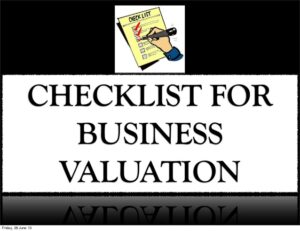In finance, valuation is the process of determining the current worth or present value of a business, asset or property. It estimates the economic value of a company, unit or asset.
For an entrepreneur, valuation is very important for a number of reasons. Some of these reasons include:
- It determines your business’s relative value in the marketplace thereby helping you understand its net worth.
- It measures progress of your business in respect to the set strategic plan of the business.
- It helps you effectively manage your business since it tracks how efficient your decision-making processes and performance are.
- It gives you a competitive advantage when aiming to secure capital.
- It provides a baseline to help you ascertain exactly how your business is faring, what you are doing well and what needs to be improved upon.
- It helps you make projections for the future and aid your decision making patterns.
- It serves as a means of ensuring accountability in your business.
- It can be useful in identifying gaps in your business.
- It is important in resolving tax or legal issues.
There are a number of ways to determine the worth of a company. Some of the most commonly used methods of valuing a business include:
- Comparison Method of Valuation – This method is predominantly used in determining the market value of an asset. In this method, the primary asset is compared with similar assets that were recently sold as well as those that are currently on sale in a given locality. The features, advantages and disadvantages of said assets are taken into consideration. The impact of individual features in relation to the overall value of the asset are also noted. Adequate adjustments are made afterwards and the value of such an asset is estimated. This is because in this method, the value of the asset is the sum of the values of its individual features. The comparison method is often used in valuation because it is relatively easy to calculate and is often current.
- Cost Approach – This approach considers the cost it currently entails to rebuild an asset/business or replace it. While this method is not very commonly used in corporate finance, it can be used in startups or early stage companies where comparison to other companies may not be credible or estimated future projections, unreliable. It ignores generation of cash flow and works on the basis of cost being equal to value. Despite its many limitations, this method is quite popular in real estate, property and investment valuation.
- Discounted Cash Flow Approach – The DCF analysis is an intrinsic value (looks at the inherent value of the company without comparing it to another) approach in which the unlevered free cash flow of the business is estimated (into the future) and further discounted (to current times) at the organisation’s weighted average cost of capital. The value of an asset using this method is determined by the amount of current and expected cash inflow to be generated during the duration of an investment period while considering the possible inflation rate and adjusting the cash flow to present day values. This is done by deferring them for the stipulated time frame at appropriate discount rates. This method requires a robust amount of estimates, assumptions, details and analysis. This approach allows an analyst to forecast the value of a business or asset based on various scenarios and also carry out a sensitivity analysis.
Need help with your business valuation? Book an experienced consultant on Kleos Africa today!




